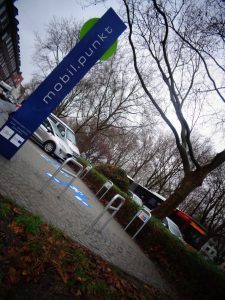42 mobil.punkte and growing
The expansion of mobil.punkte in Bremen was quite extensive in 2019. A total of twelve new mobil.punkte have been implemented this year, eight of them in peripheral areas where new concepts and participation procedures have had to be developed in order to ensure uptake in these neighbourhoods servicing non-traditional target groups.
With the mobil.punkte, in particular, car-sharing is positioned at highly visible, easily accessible and, therefore, safe locations in the neighbourhoods. They contribute to closing the gap in the car-sharing network in Bremen and making shared mobility services more accessible to citizens throughout the city. Each mobil.punkt is designed individually to meet the needs of the respective neighbourhood. No station is exactly like another. In Bremen, a great deal of emphasis is placed on general infrastructure improvements in addition to providing new mobility services to a neighbourhood. For example, at some of the newest stations, improvements were made to the paving materials to better rainwater infiltration of paved surfaces, contributing to climate change adaption in the city. At other locations, pedestrian crossings for people with limited mobility and visual impairments were implemented in conjunction with the mobil.punkte. And as usual, bicycle parking in the areas was also improved. These measures provide an added benefit for the neighbourhood that goes beyond the shared mobility services.
The close work with the district offices, elected neighbourhood parliaments, the streets planning department and other stakeholders makes these tailored solutions possible. The support of the district councils is particularly important. In Bremen, they are engaged at an early stage in the planning process and accompany the mobil.punkt development from the selection of suitable locations to the communication in the neighbourhoods. The strategic planning process is carried out by the Ministry for Climate Protection, the Environment, Mobility, Urban and Housing Development and supported by the parking management organisation, the BREPARK.
The mobil.punkte in Bremen host only station-based car-sharing, the form of car-sharing that has the greatest impact on reducing parking pressure in cities. In a study that was released by the German Car-Sharing Association (Bundesverband CarSharing e. V.) this year, the impact of different car-sharing forms on car-ownership was compared. In a press release, the Association stated: „Different car-sharing forms have different impacts on car-ownership and car-use. […] Most of all, station-based car-sharing contributes to the reduction of privately owned cars. Free-floating car-sharing, on the other hand, hardly has any impacts that alleviate transport-related problems.” In Bremen, every car-sharing vehicle replaces 16 privately owned cars. This is an important contributor to reducing parking problems and congestion in the city.
The selection of a provider to operate the car-sharing services at a mobil.punkt is carried out via a nationwide expression of interest procedure. Car-sharing providers must meet certain quality criteria in order to qualify to apply. These criteria include fulfilling the requirements of the German environmental certification for car-sharing (Blauer Engel) and proof that the provider has an impact on reducing car-ownership. For the twelve new stations implemented in Bremen this year, only one provider applied. However, in addition to having a very positive impact on reducing car-ownership, the customers of this provider indicated a high level of satisfaction with the current services, as shown in an independent study published by Team Red Deutschland and funded by SHARE-North in 2018.
For the year 2020, the City of Bremen is planning several new mobil.punke, including a hub in a housing area that will experiment with the implementation of provider-neutral package stations. Planning for this as well as the participation process is ongoing. The City of Bremen will look to its SHARE-North partners and the Interreg Northwest Region project “eHubs” for inspiration for this undertaking.

 Share North
Share North

